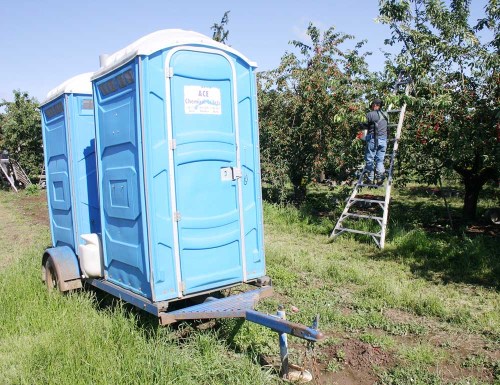Emergency farmworker housing, sanitation rule nets 33 violations
Published 1:00 pm Friday, October 16, 2020

- Oregon OSHA implemented a temporary rule to protect agricultural workers from spreading COVID-19, including a provision requiring one portable toilet for every 10 workers in the field. A state program to help farmers buy equipment has expired with millions of dollars left over.
SALEM — An emergency rule to protect Oregon agricultural workers from COVID-19 during this year’s harvest is set to expire Oct. 25. So far, the rule has resulted in 33 violations, officials say.
The temporary regulations were adopted by the state Occupational Safety and Health Administration in June, which strengthened housing, field sanitation and transportation requirements for labor-intensive farms amid the coronavirus pandemic.
Among the new standards, farms were instructed to provide additional portable toilets and hand-washing stations for harvest crews, clean facilities more frequently and hire one or more “social distancing officers” to ensure workers remained 6 feet apart while on the job.
Labor camps also had to be reconfigured on the fly to ensure beds were spaced 6 feet apart, or separated by an impermeable barrier. Unrelated workers were not allowed to share bunk beds.
Michael Wood, Oregon OSHA administrator, said the rule initially raised a lot of questions and concerns from farmers worried about increased costs. Gov. Kate Brown ultimately allocated $30 million in federal coronavirus relief funding to help offset some of the financial burden, including $16 million in direct compensation for farms.
Oregon OSHA issued 33 violations related to farmworker housing and sanitation between June 13 and Oct. 28, stemming from inspections at 13 farms.
“From a relatively small sample based on enforcement activity … most farms were substantially in compliance. I think that’s a good sign,” Wood said.
However, Wood added the raw figures may not necessarily reflect everything that has been happening on the ground. Farmworkers may be reluctant to report violations, he said, due to fear of retaliation from employers, language barriers or other factors.
“In any environment where the employment relationship is unstable, you’re going to have an increased reluctance to complain to government,” Wood said. “If I had to just sort of lay out my gut impression based on a variety of data sources, I think by and large, farmers took (the rule) seriously, but there are probably significant exceptions to that.”
So far in 2020, Oregon OSHA has received 11,617 complaints versus 2,000 in a normal year. Nearly half of those are tied to grocery stores, retail and restaurants. The Oregon Farm Bureau reports less than 3% of complaints are tied to agricultural operations, and only a handful resulted in an any enforcement activity.
“We’re not seeing massive amounts of willful violations,” said Samantha Bayer, policy counsel for the bureau. “I think the numbers and the data we’re seeing proves the system is working.”
Among the 13 farms hit with field sanitation violations, fines ranged from nothing to $600. A spokesman for Oregon OSHA said farms may appeal the penalties, though none have so far.
Recurring violations included not sanitizing portable toilets and sinks at least three times per day, or not displaying the proper field sanitation notice with information for employees to report violations anonymously, which Wood said for him were a little concerning.
“If we were more frequently citing people for lack of social distancing, we would think that was just a breakdown in implementation,” he said. “It seems like if employers had come up with a plan to fully comply, this wouldn’t be the sort of thing they were missing.”
With the pandemic ongoing and no vaccine to date, Wood said Oregon OSHA is considering a comprehensive COVID-19 policy as part of its infectious diseases rulemaking that would address all workplaces. He said the agency is eyeing adoption no later than Oct. 21. The temporary standard would remain in place for 180 days.
“It’s clearly an issue we’ll have to talk about for the next agricultural season as well,” Wood said.









